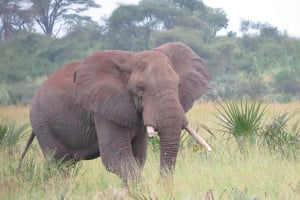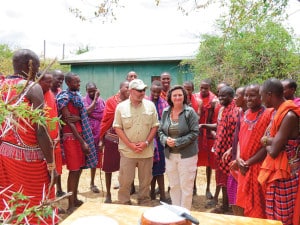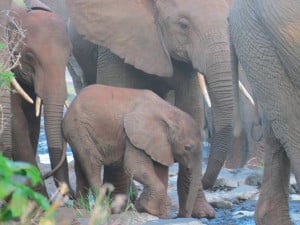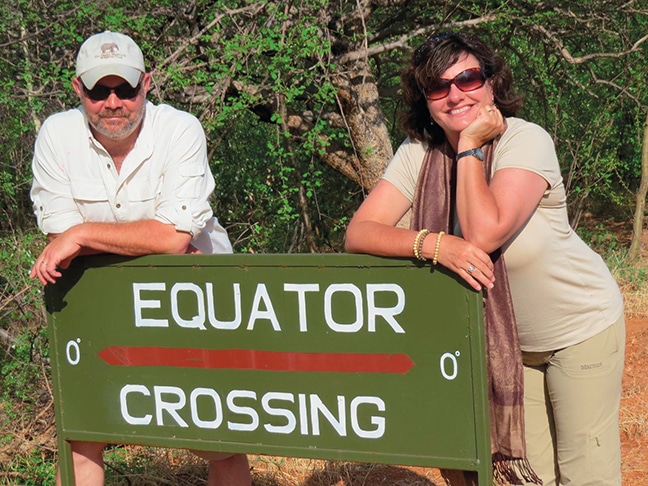Local Army Vet Soon To Climb Africa’s Highest Peak
By Lydia Crochet
After serving his country for 21 years, LTC (R) Army-retired Brian Johnson, of Lake Charles, is gearing up to battle a completely different kind of obstacle — a mountain. And not just any mountain, the majestic Mount Kilimanjaro, Africa’s highest peak. While it’s true that this Army Veteran is an adventurist, his motivation to take on such a treacherous challenge stems from an unlikely source — elephants.
Brian Johnson and his wife, Kitty Stephens Johnson, grew up in Lake Charles and are both graduates of Barbe High School. After graduating from McNeese State University, Brian was commissioned an officer in the U.S. Army, where he launched a military career that would take the pair around the world. He would eventually put in 21 years of military service.
When in Africa, the Johnsons spend most of their time advocating for endangered wildlife. In fact, several months ago, they completed a volunteer assignment in Naboisho Conservancy, collecting data on big cats and assisting researchers in an effort to better understand the health of lion, leopard and cheetah populations in the conservancy. But when the Johnsons became involved with the Save the Elephants organization in Kenya in July of 2014, that’s when they knew they needed to do something more.
On a previous trip to Kenya, the Johnsons met the Hamilton family — prominent elephant conservationists and founders of the non-profit organization Save the Elephants. Later, the Johnsons returned and stayed at the Elephant Watch Camp and toured Save the Elephant’s research base in Samburu, Kenya, where elephants roamed freely throughout the lodge grounds. Brian recalls, “At night, we fell asleep to elephants grazing 10 feet away from our tent.”
These magnificent creatures are facing the threat of extinction because of ivory poachers. Seeing the devastation that poaching has done to the elephant population first hand has led the John

sons on a quest to not only raise awareness to this travesty, but to also raise funds. “We love elephants and treasure the time we have spent with them. It would be a depressing world if the magnificent elephant no longer graced the savannahs and jungles of Africa‚” says Brian.
And he has good reason to be concerned. According to recent studies, approximately 100,000 elephants were killed by poachers in Africa from 2010-2012 to satisfy a global demand for ivory. It is estimated that approximately 96 elephants a day are killed by poachers across Africa. Some conservationists argue that elephants have reached the

tipping point of survival and are on a glide path to extinction if the current rate of poaching continues. Elephants only give birth once every 2-4 years, with the gestation period being about 22 months. Brian relents, “The math does not work in elephant’s favor.”
Why should we care? Why do we need to take immediate action on behalf of these amazing animals? The Johnsons explain, “Elephants are a keystone species, meaning they help maintain a delicate balance in ecosystems. They make waterholes that other animals use as water sources and they create trails that act as firebreaks and water run-offs. Since elephant droppings are rich in nutrients, they replenish depleted soils and are critical in seed dispersal. Not only is elephant poaching an environmental crisis, but security services assess that proceeds from the illegal ivory trade help fund terror organizations in Africa.”

Aside from being an environmental necessity, elephants are intelligent, emotional and social creatures. They care for a sick herd member by bringing it food and helping it to stand if it’s too weak to get up on its own. They hug each other by wrapping their trunks together in displays of greeting and affection. When a member of the herd dies, elephants will have a funeral by engaging in death rituals and mourning. They are one of the only known mammals besides humans to do this. They are docilecreatures and, unlike poachers, will only attack if they sense immediate danger.
The Johnsons are currently on a mission to raise funds to support the work of Save the Elephants. Beginning Oct. 16 of this year, Brian will be leading a team to the top of Mount Kilimanjaro, Africa’s highest mountain.
Their goal is to raise $19,341, which is the exact height (in feet) of Mount Kilimanjaro.
If you would like to contribute, visit Brian’s event page on Facebook, Climbing Africa’s Highest Peak for Elephants. You can also visit the event’s fundraising page at connect.clickandpledge.com. The climbing team will be paying their own expedition expenses and every dollar raised will go directly to Save the Elephant’s (the donation is tax deductible).
To learn more about the Save the Elephant’s organization, visit their website at www.savetheelephants.org.


















Comments are closed.